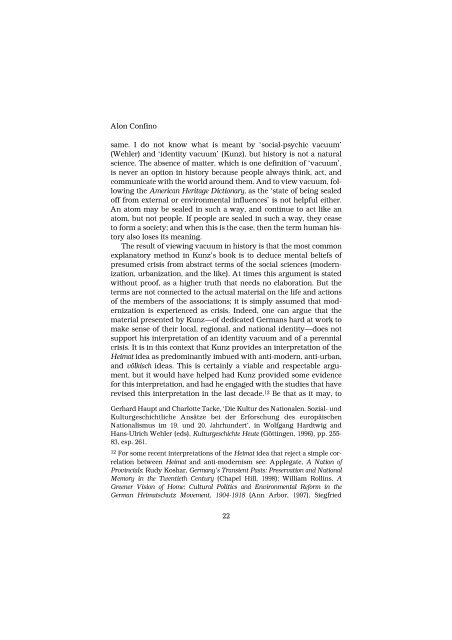Download - German Historical Institute London
Download - German Historical Institute London
Download - German Historical Institute London
Create successful ePaper yourself
Turn your PDF publications into a flip-book with our unique Google optimized e-Paper software.
Alon Confino<br />
same. I do not know what is meant by ‘social-psychic vacuum’<br />
(Wehler) and ‘identity vacuum’ (Kunz), but history is not a natural<br />
science. The absence of matter, which is one definition of ‘vacuum’,<br />
is never an option in history because people always think, act, and<br />
communicate with the world around them. And to view vacuum, following<br />
the American Heritage Dictionary, as the ‘state of being sealed<br />
off from external or environmental influences’ is not helpful either.<br />
An atom may be sealed in such a way, and continue to act like an<br />
atom, but not people. If people are sealed in such a way, they cease<br />
to form a society; and when this is the case, then the term human history<br />
also loses its meaning.<br />
The result of viewing vacuum in history is that the most common<br />
explanatory method in Kunz’s book is to deduce mental beliefs of<br />
presumed crisis from abstract terms of the social sciences (modernization,<br />
urbanization, and the like). At times this argument is stated<br />
without proof, as a higher truth that needs no elaboration. But the<br />
terms are not connected to the actual material on the life and actions<br />
of the members of the associations; it is simply assumed that modernization<br />
is experienced as crisis. Indeed, one can argue that the<br />
material presented by Kunz—of dedicated <strong>German</strong>s hard at work to<br />
make sense of their local, regional, and national identity—does not<br />
support his interpretation of an identity vacuum and of a perennial<br />
crisis. It is in this context that Kunz provides an interpretation of the<br />
Heimat idea as predominantly imbued with anti-modern, anti-urban,<br />
and völkisch ideas. This is certainly a viable and respectable argument,<br />
but it would have helped had Kunz provided some evidence<br />
for this interpretation, and had he engaged with the studies that have<br />
revised this interpretation in the last decade. 12 Be that as it may, to<br />
Gerhard Haupt and Charlotte Tacke, ‘Die Kultur des Nationalen. Sozial- und<br />
Kulturgeschichtliche Ansätze bei der Erforschung des europäischen<br />
Nationalismus im 19. und 20. Jahrhundert’, in Wolfgang Hardtwig and<br />
Hans-Ulrich Wehler (eds), Kulturgeschichte Heute (Göttingen, 1996), pp. 255-<br />
83, esp. 261.<br />
12 For some recent interpretations of the Heimat idea that reject a simple correlation<br />
between Heimat and anti-modernism see: Applegate, A Nation of<br />
Provincials; Rudy Koshar, <strong>German</strong>y’s Transient Pasts: Preservation and National<br />
Memory in the Twentieth Century (Chapel Hill, 1998); William Rollins, A<br />
Greener Vision of Home: Cultural Politics and Environmental Reform in the<br />
<strong>German</strong> Heimatschutz Movement, 1904-1918 (Ann Arbor, 1997). Siegfried<br />
22













